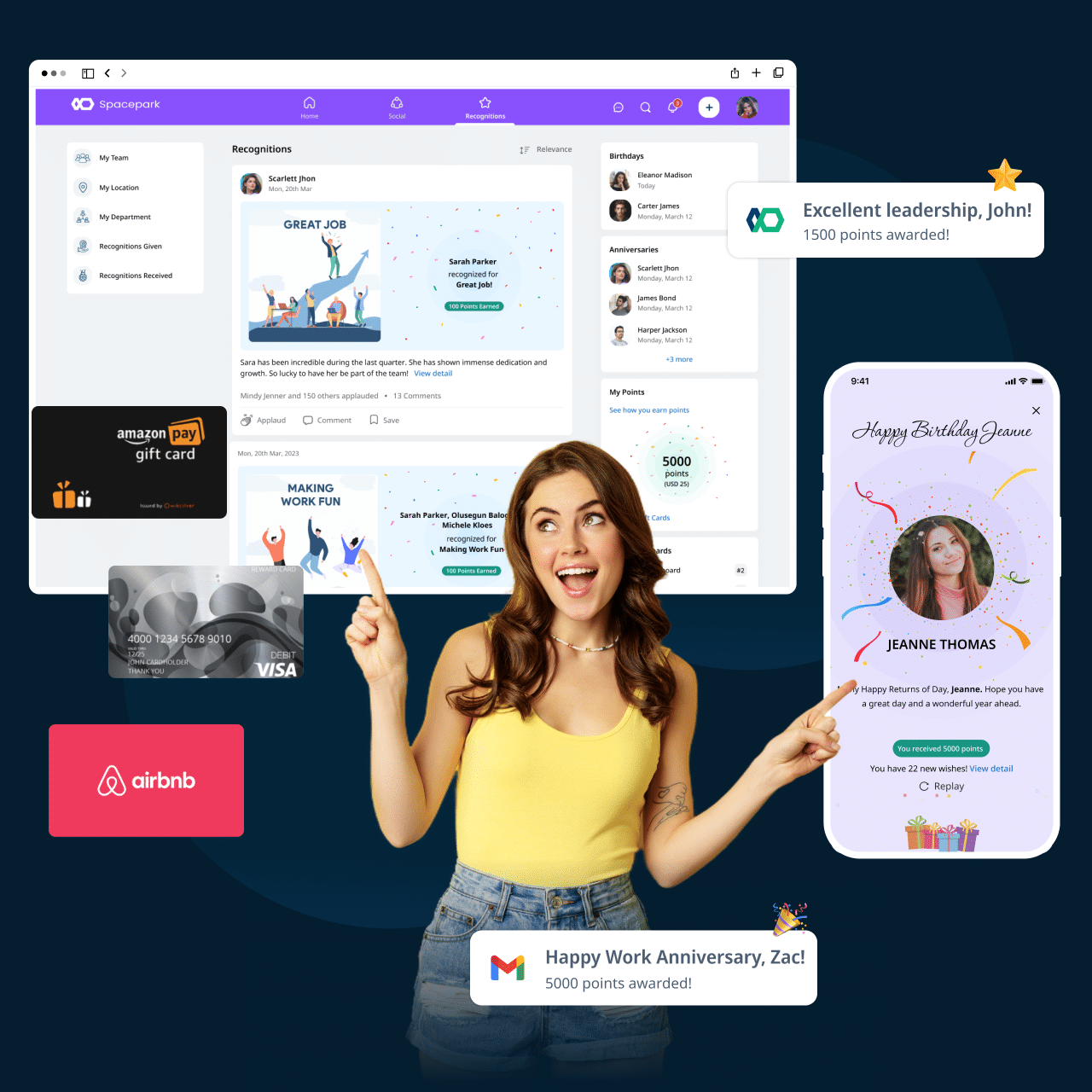Celebrate Success, Boost Engagement, Thrive
Transform your workplace culture with HubEngage’s AI-powered employee recognition platform. Automate milestone celebrations and create personalized recognition experiences with customizable templates for your unique programs.
Tailor programs to fit your organization’s needs, whether small teams or large enterprises. Foster a culture of appreciation that boosts morale, engagement, and productivity—while rewarding employees with gift cards and incentives that drive motivation.
Sit Back, Gamify, See Real Impact
Automate Milestone Recognitions with Ease
Celebrate every milestone—birthdays, work anniversaries, and more—without lifting a finger. Simply set it up and let our employee recognition platform handle the rest. Automatically send personalized recognitions, reward employees with points or gift cards, and allow colleagues to join in the celebration. Keep morale high and create meaningful moments effortlessly!

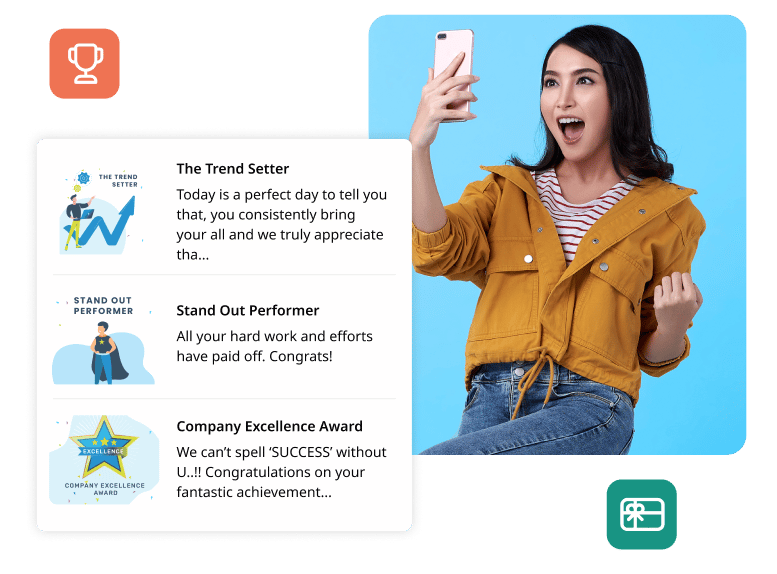
Recognize Achievements, Celebrate Contributions
With our customizable recognition templates, you can effortlessly align your employee recognition program with your company’s values and mission. Celebrate individual achievements or encourage peer-to-peer appreciation, all while highlighting employees who contributes to your organizational goals. Create a culture of recognition that motivates and inspires! .
Fuel Team Spirit with Peer-to-Peer Recognition
A heartfelt “thank you” or appreciation from a colleague can strengthen bonds and build stronger teams. With our employee recognition platform, empower your employees to celebrate each other’s efforts and foster a culture of mutual recognition and support.
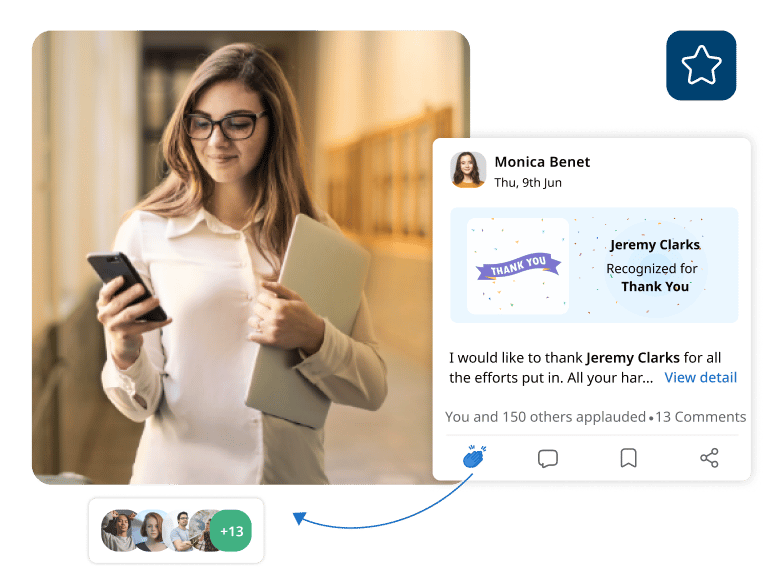

Reward with Points and Gift Cards
Effortlessly incentivize employees with points for recognitions and participation. Accumulated points can be redeemed for rewards through your preferred provider or gift cards available directly on our platform, driving engagement and motivation across the organization.
Drive Participation with Gamification
Keep employees engaged with gamification that rewards participation. Encourage them to actively contribute to recognitions by celebrating, applauding, or commenting. Employees earn points for their involvement, which can be redeemed for custom rewards or gift cards from our extensive catalog, driving ongoing engagement and participation across the platform.
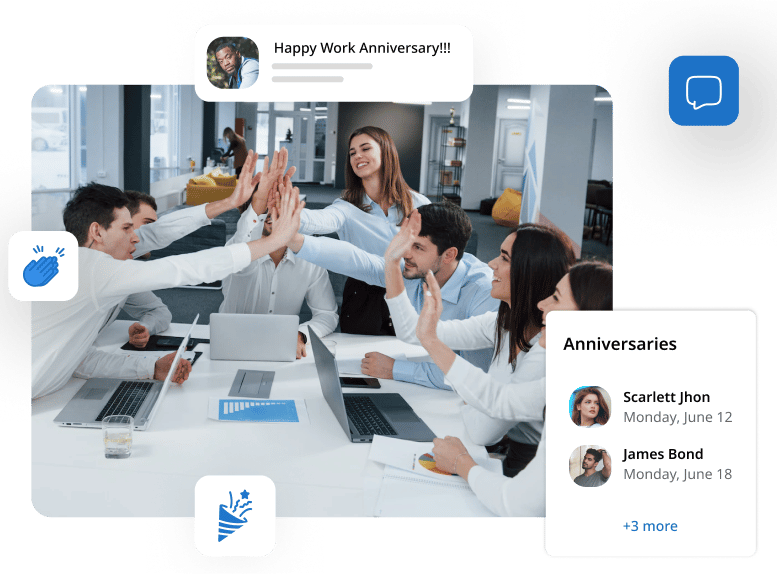

Boost Engagement with Multi-Channel Notifications
Maximize engagement by notifying employees through multiple channels—push notifications in your branded app, emails, or text messages. Set up automated nudges to encourage peer-to-peer recognition, keeping employees motivated to appreciate one another. Display recognitions on digital screens to make every moment of acknowledgment visible and celebrated.
Track Impact, Measure Engagement
Gain powerful insights into your recognition program with detailed analytics. Identify top performers and recognize employees who are driving motivation and engagement within their teams. Track activity with our proprietary Recognition Score to see who is most active in recognizing and encouraging others. Use this data to continually refine your recognition strategy and drive even greater engagement.
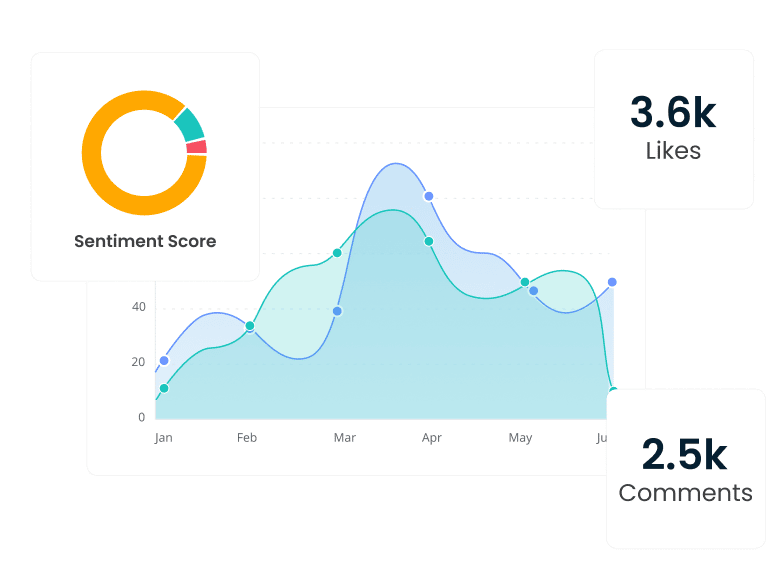
Recognize across multiple channels
Our multichannel approach with mobile apps, web-based intranet, emails, text messaging and digital displays helps you reach and recognize 100% of your workforce anytime, anywhere.
Companies of all sizes trust HubEngage






Hospitality, Extended Stay America:
The HubEngage employee communication tool allows each of our associates to be great ambassadors for Extended Stay America. It is a great tool that is helping us attract new associates.
Retail/Manufacturing, Smartwool:
The HubEngage employee software is incredibly well thought out. The tech has easy access to countless tasks, and their client service for any “out of the box” ideas we come up with, is fantastic. Our retailers couldn’t be happier with the app.
Manufacturing, Great Dane:
After evaluating a number of apps, we chose the HubEngage intranet platform based on the quality of their user experience. They are extraordinarily responsive to all our questions (and we have a lot of them!). And they walk us through – everything.
Learn more about employee recognition platform
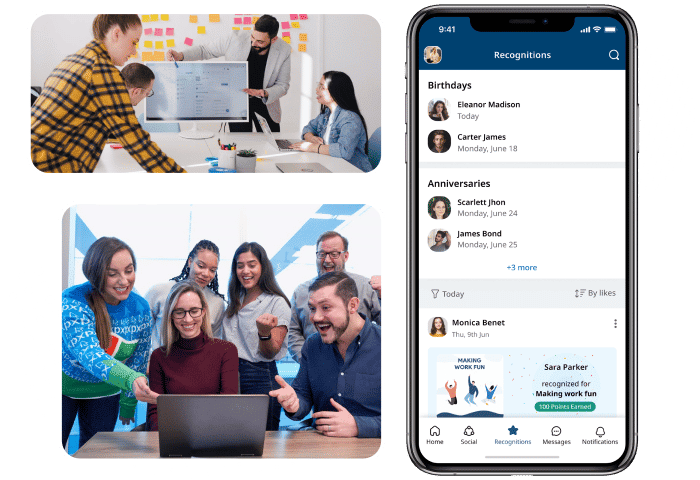
Download Whitepaper
Transform your workplace: Get our whitepaper on recognition strategies!
Employee Recognition Software / Platform FAQs
Recognizing employees for their hard work and accomplishments is crucial for several reasons. First and foremost, it makes employees feel valued and appreciated, which leads to increased job satisfaction and motivation. When employees know that their efforts are recognized and appreciated, they are more likely to go above and beyond in their work and take pride in what they do. This, in turn, fosters a positive work culture where employees are eager to contribute their best.
Moreover, employee recognition plays a key role in employee retention. Employees who feel appreciated are more likely to stay with their current employer and less likely to seek opportunities elsewhere. This can help reduce employee turnover and the associated costs of recruiting and training new employees.
Employee recognition also has a significant impact on employee engagement. When employees feel recognized and valued, they are more likely to be engaged in their work and committed to the success of the organization. Engaged employees are more productive, innovative, and collaborative, which ultimately contributes to the overall success of the company.
Furthermore, employee recognition can have a positive ripple effect within the organization. When employees witness their colleagues being recognized and rewarded for their achievements, it creates a sense of healthy competition and inspiration. This can motivate other employees to strive for excellence and contribute to a culture of continuous improvement.
Lastly, employee recognition can enhance the employer brand and reputation. When an organization is known for valuing and recognizing its employees, it becomes an attractive place to work. This can help attract top talent and differentiate the company from its competitors in the job market.
Creating an effective employee recognition program requires careful planning and consideration. Here are some key elements to keep in mind:
Setting Clear Criteria for Recognition
A successful program starts with clearly defined criteria for recognition. Establish specific objectives and performance benchmarks that employees need to meet to be eligible for recognition. This ensures fairness and transparency, and allows employees to understand the expectations and goals they need to strive for.
For example, if you run a sales team, you might set criteria such as achieving a certain sales target, consistently meeting customer satisfaction goals, or demonstrating exceptional teamwork. These clear criteria provide employees with a roadmap for success and give them something tangible to work towards.
Furthermore, it’s important to periodically review and update the criteria to ensure they remain relevant and aligned with the organization’s goals. As the business landscape evolves, so too should the recognition program.
Ensuring Fairness and Transparency
Transparency is crucial to maintaining the integrity of your recognition program. Ensure that the criteria for recognition are communicated openly and that the selection process is fair and unbiased. Implementing a clear and transparent system helps prevent favoritism and promotes equal opportunities for all employees.
One way to ensure fairness is by establishing a committee or panel responsible for reviewing and selecting recipients of recognition. This committee should consist of individuals from different departments or levels within the organization to provide diverse perspectives and minimize biases.
Additionally, consider implementing a nomination process where employees can nominate their peers for recognition. This not only encourages employee engagement but also allows for a wider range of perspectives in the selection process.
Incorporating Employee Feedback
Listening to your employees’ voices is essential when designing a recognition program. Seek feedback from your team and involve them in the decision-making process. By incorporating their input, you show that their opinions matter, and you can tailor the program to their needs and preferences.
Hold regular feedback sessions or surveys to gather insights on what types of recognition are most meaningful to your employees. Some may value public recognition in team meetings, while others may prefer private acknowledgments or tangible rewards.
Furthermore, consider creating opportunities for employees to recognize each other. Peer-to-peer recognition not only fosters a positive and supportive workplace culture but also allows for a more inclusive and comprehensive recognition program.
Remember, an effective recognition program goes beyond just rewarding employees for their achievements. It should create a sense of appreciation, motivation, and pride among your workforce. By incorporating these key elements into your program, you can build a culture of recognition that drives employee engagement and contributes to the overall success of your organization.
One of the key benefits of employee recognition software is its ability to provide real-time feedback. Traditional recognition methods, such as annual performance reviews, often lack immediacy. With recognition software, managers can instantly acknowledge and reward employees for their achievements, reinforcing positive behaviors and motivating continued success.
Moreover, employee recognition software allows for peer-to-peer recognition, empowering team members to appreciate each other’s efforts. This not only enhances employee morale but also promotes a culture of collaboration and teamwork. When employees feel encouraged to recognize their colleagues, it fosters a supportive environment where everyone feels valued and motivated to contribute their best.
Another advantage of employee recognition software is its performance tracking feature. By monitoring and analyzing individual and team performance, managers can identify top performers and high-potential employees. This data-driven approach enables organizations to make informed decisions regarding promotions, career development opportunities, and succession planning.
Furthermore, employee recognition software simplifies the process of managing rewards and incentives. It provides a centralized platform where managers can allocate and distribute rewards based on predefined criteria. This ensures fairness and transparency in the recognition process, preventing any biases or favoritism.
Implementing employee recognition software can have a profound impact on workplace performance. Let’s explore some of the key ways this software can enhance employee productivity and engagement.
Boosting Employee Morale and Engagement
Employee recognition software provides a platform for managers and peers to publicly acknowledge and appreciate outstanding performance. This recognition boosts employee morale and motivation, leading to a more engaged workforce. When employees feel valued, they are more likely to go the extra mile and take pride in their work.
Furthermore, employee recognition software allows for a more inclusive and democratic approach to recognition. It enables employees to recognize and appreciate their colleagues’ efforts, fostering a culture of mutual support and camaraderie. This sense of belonging and teamwork further enhances employee morale and engagement.
Increasing Productivity and Efficiency
Recognizing and rewarding employees for their hard work and achievements encourages a culture of productivity and efficiency. By implementing employee recognition software, organizations can inspire healthy competition among team members and motivate them to consistently perform at their best. The software also allows for real-time feedback, helping employees to continuously improve their skills and performance.
In addition to boosting productivity, employee recognition software can also help streamline workflows and processes. By providing a centralized platform for recognition, it ensures that no employee’s efforts go unnoticed. This fosters a sense of fairness and transparency, encouraging all employees to contribute their best work and collaborate effectively.
Reducing Employee Turnover
According to a report published by the Bureau of Labor, around one-third of new hires quit their jobs in just six months. Forget compensation and benefits, a resounding 76% said that they would look for another job if they didn’t feel valued and appreciated in the workplace. One of the significant benefits of employee recognition software is its impact on employee retention. When employees feel valued and recognized for their contributions, they are more likely to develop a sense of loyalty and commitment to the organization. Recognition programs help create a positive work environment where employees feel appreciated, reducing the likelihood of turnover and the associated costs.
Moreover, employee recognition software can contribute to a strong employer brand. When employees are recognized and appreciated, they become brand ambassadors, spreading positive word-of-mouth about their organization. This can attract top talent and further reduce turnover by creating a reputation as an employer that values and invests in its employees.
Implementing an employee recognition platform requires careful thought and consideration. To ensure a successful implementation, organizations should follow a structured approach and address any potential challenges that might arise. Here are the steps to implement a recognition platform effectively.
Steps to Implement a Recognition Platform
- Define objectives: Clearly establish the goals and objectives of the employee recognition program. Determine what you hope to achieve through the program and how it aligns with the overall organizational strategy.
When defining objectives for your employee recognition platform, it is important to consider the specific needs and culture of your organization. Are you aiming to improve employee morale, increase productivity, or enhance employee engagement? By clearly defining your objectives, you can tailor the recognition program to meet those goals.
Additionally, involving key stakeholders, such as department heads or team leaders, in the objective-setting process can help ensure alignment with the overall organizational strategy and increase buy-in from employees. - Choose the right platform: Research and select an employee recognition platform that fits your organization’s needs and budget. Consider factors such as ease of use, customization options, reporting capabilities, and integration with other HR systems.
When choosing the right platform, it is essential to consider the specific requirements of your organization. Does your organization have a global workforce? If so, selecting a platform that supports multiple languages and currencies may be crucial. Do you have remote or mobile employees? In that case, finding a platform with a mobile app or responsive design can ensure accessibility for all employees.
Furthermore, seeking input from employees who will be using the platform can help identify their preferences and requirements, leading to a more successful implementation. - Communicate the program: Clearly communicate the employee recognition program to all employees. Explain the purpose, benefits, and how it aligns with the company’s values and culture. Encourage employees to participate and provide feedback throughout the implementation process.
Effective communication is key to the successful adoption of an employee recognition platform. It is important to clearly articulate the purpose of the program and how it can benefit both employees and the organization as a whole. By emphasizing the alignment with company values and culture, employees are more likely to see the program as meaningful and relevant.
Providing regular updates and reminders about the program, through various communication channels such as email, intranet, or team meetings, can help maintain awareness and encourage participation. Additionally, creating opportunities for employees to provide feedback and suggestions can foster a sense of ownership and engagement throughout the implementation process. - Promote participation: Create awareness around the program and encourage employee participation. Provide training and resources to ensure employees understand how to use the recognition platform effectively. Consider running contests, challenges, or incentives to motivate employees to engage with the program.
Driving employee participation is essential for the success of an employee recognition platform. To promote participation, organizations can launch awareness campaigns, using various communication channels, to highlight the benefits and impact of the program. This can include success stories, testimonials, or statistics that demonstrate the positive outcomes of employee recognition.
Offering training sessions or resources that guide employees on how to use the platform effectively can remove any barriers to participation. By providing clear instructions and addressing any concerns or questions, employees will feel more confident in utilizing the recognition platform.
Furthermore, introducing gamification elements such as contests, challenges, or incentives can add an element of fun and motivation to the program. Recognizing and rewarding employees who actively engage with the platform can create a sense of healthy competition and encourage continuous participation. - Evaluate and refine: Regularly evaluate the effectiveness of the employee recognition platform and make necessary adjustments. Collect feedback from employees and managers, and use data analytics to measure the program’s impact on employee engagement, productivity, and turnover rates.
Continuous evaluation and refinement are essential for the long-term success of an employee recognition platform. By collecting feedback from employees and managers, organizations can gain valuable insights into the strengths and weaknesses of the program. This feedback can be gathered through surveys, focus groups, or one-on-one discussions.
Data analytics can also play a crucial role in measuring the impact of the recognition platform. By analyzing metrics such as employee engagement levels, productivity rates, and turnover rates, organizations can identify trends and make data-driven decisions to improve the program.
Regularly reviewing and refining the program based on feedback and data analysis ensures that the employee recognition platform remains relevant and effective in meeting the evolving needs of the organization and its employees.
When selecting an employee recognition software for your organization, it is essential to consider the following key features:
Customizable Recognition Programs
Effective software should allow organizations to customize their recognition programs according to their specific needs and company culture. This customization ensures that the recognition is meaningful, aligns with organizational values, and resonates with employees.
Customizable recognition programs give organizations the flexibility to design unique and tailored approaches to acknowledging employee achievements. This can include different types of recognition, such as peer-to-peer recognition, manager-to-employee recognition, or team-based recognition. By allowing customization, software empowers organizations to create programs that truly reflect their values and goals.
Furthermore, customization enables organizations to adapt their recognition programs as their needs evolve over time. It allows for the incorporation of new initiatives, such as wellness programs, diversity and inclusion efforts, or sustainability achievements, into the recognition framework.
Peer-to-Peer Recognition
Peer-to-peer recognition is a powerful tool that promotes a culture of appreciation and collaboration within the organization. An employee recognition platform enables employees to recognize and appreciate their colleagues’ efforts, fostering a sense of camaraderie and teamwork. When employees can acknowledge and praise their peers’ achievements, it not only boosts morale but also strengthens relationships and encourages a supportive work environment.
Imagine a scenario where a team successfully completes a challenging project ahead of schedule. With an employee recognition platform, team members can publicly recognize and congratulate each other for their hard work and dedication. This peer-to-peer recognition not only motivates team members to continue performing at a high level but also creates a positive work environment where colleagues feel valued and appreciated.
Real-Time Recognition and Feedback
An essential feature of employee recognition software is the ability to provide real-time recognition and feedback. This instant recognition allows employees to feel valued and appreciated immediately, enhancing their motivation and engagement.
Real-time recognition and feedback create a culture of continuous appreciation within the organization. When employees receive timely recognition for their efforts, it reinforces positive behaviors and encourages them to continue performing at their best. It also fosters a sense of belonging and camaraderie among team members, as they can witness and celebrate each other’s accomplishments in real-time.
Additionally, real-time feedback allows for timely course correction and improvement. By providing immediate feedback on performance or achievements, employees can make necessary adjustments quickly, leading to continuous growth and development.
Integration with Other HR Tools
For seamless operations, effective software should integrate with other HR tools such as performance management systems, employee feedback platforms, and HR analytics tools. This integration ensures that employee recognition is a holistic and cohesive component of the overall HR strategy.
Integration with other HR tools enables organizations to streamline their processes and create a unified employee experience. By connecting recognition software with performance management systems, organizations can align recognition with performance evaluations, ensuring that exceptional achievements are acknowledged and rewarded appropriately. This integration also facilitates the tracking of recognition data and metrics, allowing HR teams to analyze the impact of recognition programs on employee engagement and overall organizational performance.
Furthermore, integration with employee feedback platforms enables organizations to gather insights and sentiments from employees regarding the effectiveness of recognition programs. This feedback loop helps organizations refine and improve their recognition initiatives, ensuring they remain relevant and impactful.
Overall employee recognition software should help you:
- Incentivize good work performance through meaningful rewards and recognition such as gift cards, coupons, and others
- Celebrate your employees’ milestones and special days within your recognition program
- Allow your employees to recognize and appreciate their co-workers for a better company culture & collaborative environment
- Give employees the proper tools to provide a constant source of motivation and build a sense of camaraderie with a peer recognition platform
Let's get your employees connected and engaged.


